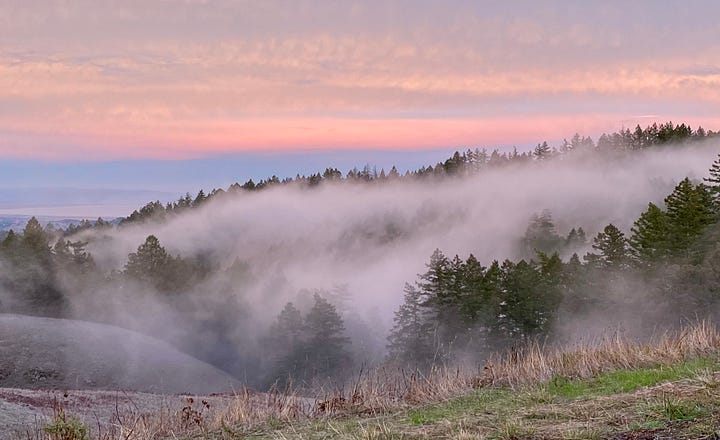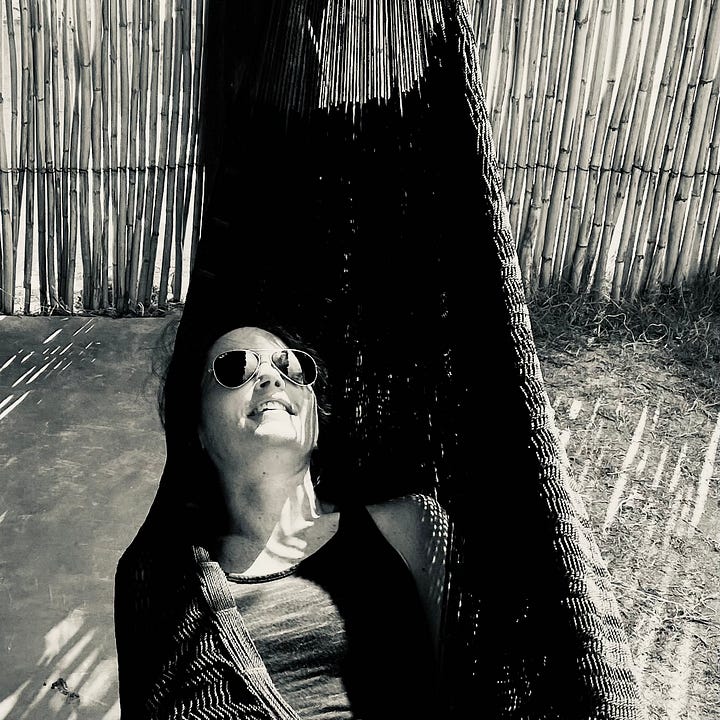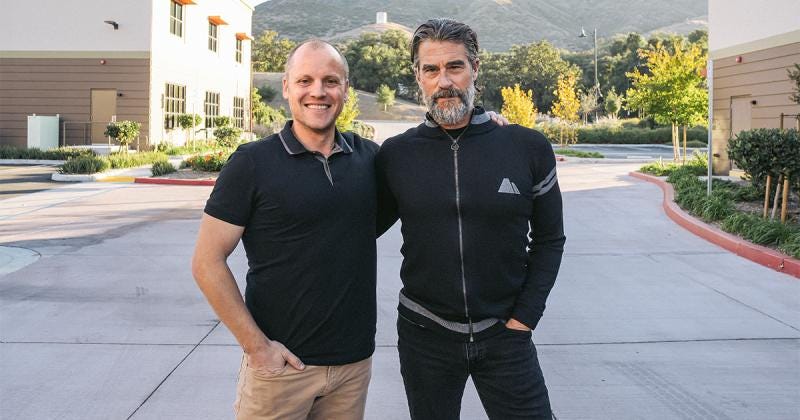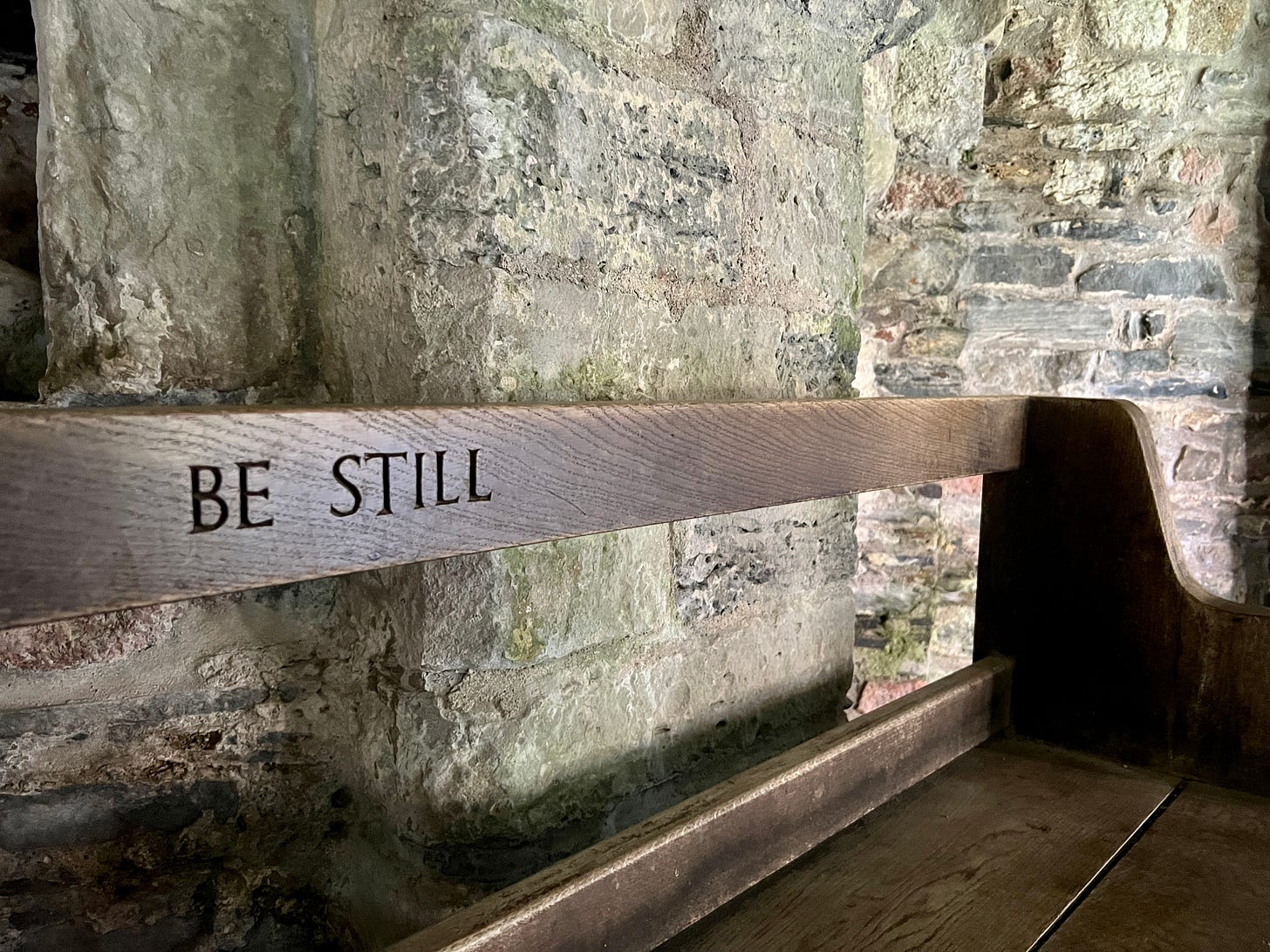TGIF :: It's Not About Alcohol
Weekly drop #41 || Six inquiries to get to the root of things
Throughout my ClearLife journey, a steady mantra has been “I’ll drink again if I want to.” For six years, I never really did, until last week.
It was the end of a long and complicated day. I was trying to make the transition from a day of meetings to an evening of hosting dinner for our family and several dear guests at home.
As I moved brusquely around our house, still in my in my boots announcing each step on our long plank hardwood floors, I let irritation flow through me: So many chores left undone! There’s not enough time to get to it all, set the table, and prepare dinner in time. Why can’t the family help more?
Then I witnessed my mind think: “A drink would really help ease this transition from work to fun right about now.”
“Alcohol (mis)use is the result.”
Clips from this Rich Roll interview of Ruari Fairbairns, the founder of One Year No Beer are all over my IG and inboxes this week (thank you!). It took a couple of days, but I finally listened to the entire 2.5 hour episode in its entirety. I recommend it for anyone who is curious about drinking less, especially men who are motivated by heightened performance at work, in relationships, and in fitness.
One of my biggest takeaways is a foundational perspective Ruari and I share: It’s not about alcohol.
A refresher on the use-abuse-addicted progression
Alcohol is addictive, yet progressive use patterns are different for everyone, depending on the person and circumstances.
Some people can drink for decades and never grow dependent while others might find themselves in an addiction loop after mere months. Pace aside, its use follows a three stage progression:
Stage 1: USE: It’s occasional and fun.
We start with recreational, take-it-or-or-leave-it use. A drink once in a while on special occasions to celebrate, honor, or mark some event of some kind. This is the “use” stage. Some people stay here their whole lives.
Stage 2: ABUSE: We rely on it.
We get accustomed to the “hit” of dopamine or relief we experience from alcohol so we start drinking habitually (several days a week, regular weekend benders, for example). This often looks like culturally sanctioned “social” drinking. Many of us start recreationally then find ourselves feeling like we need a drink to relax or enjoy certain activities: spend time with certain people, cook a meal, dine out, hangout poolside, speak publicly, have sex, dance like we mean it, get to sleep, and so on. This is the “abuse” stage. This stage can last for months, years, or a lifetime.
Stage 3: ADDICTED: We need it.
Enough abuse can eventually evolve into addiction, doing something compulsively despite adverse consequences. The grip of addiction can be physical and/or mental and it’s hard to overcome without serious help.
What do you mean it’s not about alcohol?
“Excessive” or “unhealthy” alcohol use (in his view anything more than a very occasional drink), is a “result” or a “signal” that something else is troubling us, with stress being the primary culprit. Ruari further explains that modern western cultures have a tricky combination of (1) high stress and (2) limited tools with which to relieve it. Given the pervasiveness and accessibility of alcohol as a near-term solution + the multi-billion brainwashing marketing budget behind alcohol products, it’s no wonder so many of us drink! We need relief, and the stuff is everywhere.
“And alcohol is the most readily available tool out there for helping us switch our brain off. The issue is not alcohol. The, the, the thing is not the problem. What the issue is, is a very stressed out, central nervous system, which is not being calmed down.” -R.F.
Ruari is certain that for anyone having more than a few drinks a year, alcohol is holding us back. All we have to do is stop, find other ways to deal with our stress or unpleasant emotions, hopefully resolve what truly haunts us, and carry on—likely not even wanting to drink again. He’s so sure of it, he left a vibrant and lucrative career in oil brokering to spread his alcohol awareness message (and has been at it with enormous success for 9+ years).
“There are two things people say to me after they've changed their relationship with alcohol. Number one, I had no idea the impact alcohol was having on me until I changed my relationship with it. And number two, I wish I'd done it sooner. So don't be that guy or gal. Let's not wait. Let's just get on.” -R.F.


Peeling back the layers.
Similar to OYNB, ClearLife is not about quitting booze. It is about creating a life we don’t want to dim out or escape from (which usually follows cutting out the dimmers). This is much more complicated than stopping drinking for a month or more, but it is wildly more rewarding. Ask anyone who has been alcohol free for at least a year how it’s going and most will tell you it is the best decision they ever made. Regrets? Not doing it sooner. I hear this all the time. It’s heartbreaking and motivating at once.
It’s not the better health, saved money, or the joys of hangover-free living that make the choice to live alcohol free worthwhile. The upside is what follows, what some call “emotional sobriety.”
It’s getting in touch with intuition and the ability to show up more fully in relationships with consistent authenticity, equanimity, and love.
It’s ceasing self-abandonment and learning how to form and uphold healthy boundaries.
It’s discovering we can pursue intimidating dreams knowing it’s okay if we make mistakes.
It’s stepping out of victimhood and habitual resignation and boldly moving forward in life-changing ways.
It’s a lessening compulsion to control self and others and finding freedom.
Helpful questions to ask ourselves
Approximately one out of three adults inhabit the “abuse” stage of a drinking progression and are trying to drink less or not at all—privately, publicly, alone, in community, because we need to, because we want to—you name it.
If you want to cut back and it’s difficult, you do not necessarily have a problem! It can be difficult, but this does not mean you are addicted. You still get to choose what you consume (Awareness #2) and the power to make a desired change is already inside you. (← link to a lengthier post on this from June). It might be hard (of course it is!), but that does not equate to a stigmatizing diagnosis.
Here are a few “in the moment” questions we can ask ourselves if we’re trying to cut back or stop altogether as we explore our relationship with alcohol:
Why do I want it? This is the most important question. Emulate an inquisitive kid and keep asking why. For example: I want a drink to relax. Why? So I can be more easygoing and fun with others this evening. Why? Because if I don’t, I’m stressed out. Why? Because things are really had at work/with my family/in my home. Why? Because I haven’t been being honest about my needs and I’m getting resentful. Why? To not rock the boat. Why? Because I am afraid of upsetting or disappointing people. Why? Because I learned as a kid to put my own feelings preferences aside. Why? You get the idea. At a certain point the root of our inclination to dim will come to the surface. If we can deal with that, the desire to drink just might fall away altogether. 🙇🏻♀️
How is the next 12 hours different if I don’t drink? Imagine the details: conversations, sleep, and the next morning. 🤔
Can I wait? One hour, one day, one week. Baby steps build self-awareness and these micro-adjustments can come with clear benefits. 🕰️
Can I shift this pattern? Always have a glass of wine while cooking dinner? Cook dinner earlier in the day when you’re less likely to drink. Go out to the bar with friends on Friday night? Make different plans that don’t revolve around alcohol and don’t drink. Have a whisky and watch an hour of Netflix before bed? (I loved the Oban 18 + 24 combination a decade ago!). Have tea and read instead. Even if just once! 𝌡
Can I extend myself grace? If we’ve been using something to dim a feeling, soften a pain, or avoid a truth (Awareness #4), pausing the dimmer of choice means those discomforts come up, often in intense ways. It’s important to go easy on ourselves as this happens, allow space for whatever we’re processing with compassion, and seek out help when we need or want it. ♡
What else can I do to take the edge off? Just because alcohol is easy to access and socially encouraged doesn’t mean it’s the only way to relax. What are other things we can do? My favorites include running/walking, drinking a cup of tea, deep listening to music, cleaning or organizing (really), and time connecting with loved ones. Other options include breath-work, meditation, sound therapy, creative projects, cooking, reading, and workouts. Explore. 📿
About that weeknight drink
Witnessing myself consider a drink to relieve stress was humbling and eye-opening. The thought was fleeting, but it felt important enough for me to mention it to my partner immediately, more with marvel than fear. The inclination passed as quickly as it had arisen. Chores were completed, dinner was made, and we ended up having a lovely evening (but I did notice an intense desire to go to sleep at 9pm, earlier than usual).
“I get all these business owners, these high achievers, these people coming in and they go . . . I just tried to stop drinking. And it comes back. And I'm like, yeah, but what are you doing about your stress? Well, I'm very stressed. Yeah, but what do you do? Nothing. So when we teach them these tools and they calm down that central nervous system, that is when all of the change happens.” -R.F.
Upon reflection, of course the desire wasn’t about alcohol, I was seeking relief from (work + domestic) stress—a revved up nervous system that wanted to settle. Clearly, I used other ways, including connection with my beloved and simply accepting not every single thing was going to happen as envisioned that night.
My personal “root of things” is creating situations in which there is too much to do in too little time + a deep desire to be more present for the moments. I wanted hosting dinner to feel like fun, but it felt like more work with lots of people dynamics to manage and hold. This was a double whammy, overwhelm + a competing pull to just lighten up and enjoy it all. Some part of me thought that if I could relieve the stress a bit, magically lighten up, everything would be…. better.
When I asked myself the string of “Why?” questions as outlined #1 above, the root was clear: I had taken on too much that day. This is My Thing: overdoing it.
In my seventh alcohol-free year, I am still working on “emotional sobriety” — learning to rest, allow, occasionally under-perform, and let go of control. This is so important to me, understanding its source and how to shed this pattern is one of my core intentions going into The Hoffman Process next month.
So I leave you with this…
If you occasionally use alcohol, good for you, enjoy those moments! If you are addicted to alcohol, I wish you the support you need (when you want it) to break free. If you are somewhere in the middle and want to drink less or not at all, the invitation is to examine what the underlying difficulty is and try to address that—using whatever tools you need. Because for us, it is not about alcohol.
And know, there is no single or “right” way to go about any of this. Do you.
Thank you for reading!
Be well.
❤️
Miscellaneous…
The Power of the Email Auto-Reply… I turned mine on yesterday for the first time in twelve years. “Intermittent access to email” feels important and sacred, even also a bit guilt-inducing (I’m working on that “Why?” too). I will still see and appreciate your notes and feedback, just over a longer stretch of time.
Sangha Saturdays… The next in-person version will be Saturday February 24th at 9am PT in Mill Valley, CA. RSVPs required. The next Zoom version is March 9th at 9am PT (missing February due to travel conflicts). If you’d like to join either, please indicate your interest here and you’ll be added to the (anonymous) calendar invitations.
Engaging on IG… I am in and out of connection with my ClearLifeJourney IG account for a range of reasons, but simply can’t deny the incredible resource it is for connections with people in this curious community. I also started my own explorations there, so stay present with it in various ways. Do you have accounts you love that I should be aware of? I’ll be highlighting some favorites soon.






I love your insights! I am in that push/pull with alcohol at the moment - I’m 57 and just feel like it’s time to give it up. I started January 1st and we’ll see how it goes. Feeling great so far! Thank you 🙏
love this. and I'm doing Hoffman in June! can't wait to compare notes.